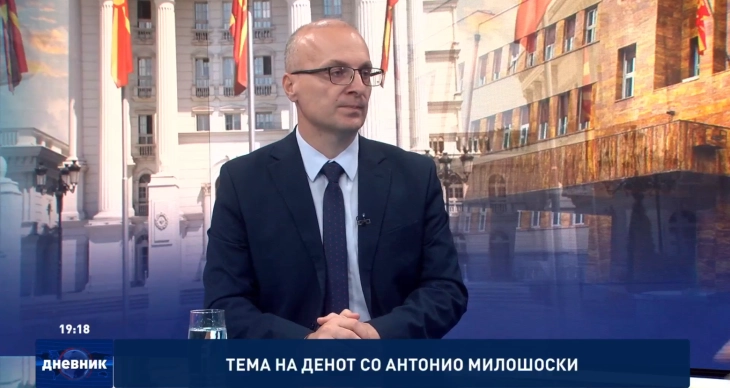Miloshoski: Having a stable government in Sofia would enable discussions on equal basis
- It would be good for Sofia to have a stable government so that discussions can take place on an equal basis, Antonio Miloshoski, Parliament’s Deputy Speaker and member of VMRO-DPMNE's executive committee, said Monday evening.

Skopje, 28 October 2024 (MIA) - It would be good for Sofia to have a stable government so that discussions can take place on an equal basis, Antonio Miloshoski, Parliament’s Deputy Speaker and member of VMRO-DPMNE's executive committee, said Monday evening.
“This political drama in Bulgaria has dragged on for too long, and these elections have yielded no decisive winner, only further fragmentation. The situation will become even more complicated as the new Bulgarian Parliament will include three political parties that are from the radical right, meaning they hold anti-European positions,” Miloshoski told Sitel TV.
For further negotiations with Bulgaria, Macedonia would benefit from a stable government with two parties, he emphasized.
“I would link the obstacles to Macedonia's progress directly to the fragmentation in Bulgaria. The problem in Macedonia began when Bulgaria had stable governments; however, the previous government in Macedonia accepted conditions that created obstacles for all future governments in Macedonia. That is why I believe the signing of that infamous second protocol by former Minister Bujar Osmani, along with advice from Kovachevski, Marichikj, and other foreign policy leaders, created the biggest problem by allowing Macedonia to enter a labyrinth of bilateralization of historical issues as a barrier on the path to the EU,” Miloshoski said.
"In my opinion, the message received from the government delegation's visit to Berlin is that the Macedonian plan sounds logical, is well-argued, and is met with understanding by most interlocutors within the EU. However, it must be noted that official Sofia also needs to give its consent for it. Therefore, it would be good for Sofia to have a stable government so that discussions can take place on an equal basis,” he noted.
Speaking about DUI, the MP said that the government led by VMRO-DPMNE is dealing with the consequences left by the rule of SDSM and DUI, including a massive budget deficit and a decline in citizens' trust in state institutions.
In regard to the letter that DUI leader Ali Ahmeti sent today to Prime Minister Hristijan Mickoski, Miloshoski said that Ahmeti is contradicting himself since he personally confirmed a few years ago that the Ohrid Agreement was a done deal and that the party had rebranded itself as green.
“And now, all of a sudden, with DUI in opposition the environment is no longer present, and the green agenda is no longer a priority. We are once again seeing an ethnicization of certain topics, such as the balancer or other similar tools that DUI had previously agreed to eliminate while in power,” Miloshoski noted.
He thinks that this letter, which he describes as pathetic, to be a desperate attempt to attract attention to himself as a supposed factor influencing the stability or instability of the state.
Ali Ahmeti, he noted, has a responsibility to reform his party to address high corruption.
Photo: VMRO-DPMNE







